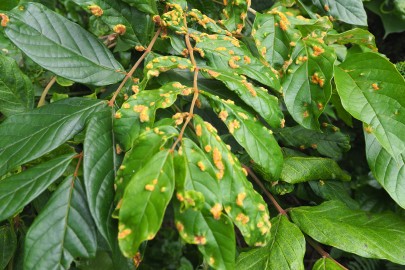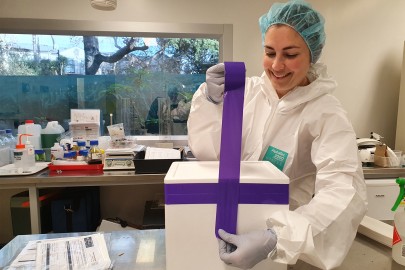In May 2022, before borders had been reopened, we were able to successfully ship a courier package containing African tulip tree (Spathodea campanulata) leaves infested with gall mites (Colomerus spathodeae) to collaborators in Tonga.
The African tulip tree is considered one of the 100 worst alien invasive species in the world and one of the top 30 terrestrial invasive plants. Introduced to many Pacific islands as an ornamental plant, the trees pose a huge threat to island biodiversity across the region. Native to tropical Africa, this fast-growing evergreen tree infests rainforests, out-competes native vegetation and impacts agricultural production. Natural enemies are now the only possible solution for reducing the impacts of this tree in many Pacific nations.

Gall mite Colomerus spathodeae damage on an African tulip tree.
Work to control the African tulip tree project is one of many projects being supported by the Global Environment Facility and New Zealand’s Ministry of Foreign Affairs (MFAT) to better manage invasive species in the Pacific. Manaaki Whenua, the Secretariat of the Pacific Regional Environmental Programme (SPREP), and the New Zealand Department of Conservation have joined forces under the auspices of MISCCAP to support Pacific Island countries and territories (PICTs) to take stronger action against invasive species, and thereby build resilience to climate change.
Manaaki Whenua’s Pacific Natural Enemies – Natural Solutions (NENS) coordinator Temo Talie says this shipment was an important milestone for Tonga, representing the first natural enemy imported to control an invasive plant there since 2008. Although natural enemies have been safely and successfully used to control invasive weeds in the Pacific for more than 100 years, there has been little activity in this space in most Pacific nations in recent years. So, rebuilding the capability to undertake this critical work in the Pacific has become an urgent task, which Manaaki Whenua is assisting with.
“The gall mites are a specialist natural enemy of the African tulip tree and form leaf galls known as erinea, which stunt new growth and reduce the invasive plant’s competitive ability,” says Temo.
After the gall mites were brought to New Zealand from Ghana, via South Africa, in 2016, they were mass-reared in our containment facility in Auckland before being released in the Cook Islands. The mites have established readily on Rarotonga, and have now spread to some outer islands.

Weed Biocontrol technician Stephanie Morton boxing African tulip tree flea beetles to be sent to Rarotonga.
In 2021, a second natural enemy for African tulip tree was imported into New Zealand in the same manner. The African tulip tree flea beetle (Paradibolia coerulea) was reared in containment in Auckland for a few months before being released in Rarotonga when a travel bubble opened up. Both the adults and larvae damage the leaves. Monitoring for establishment and impact is ongoing, and more beetles were shipped to Rarotonga in September 2022 to increase the likelihood of success.
It is expected that both natural enemies will be needed to reduce the invasiveness of African tulip tree. The gall mites and beetles have been extensively tested to ensure no other plants are at risk. Great care is undertaken to ensure that all risks, costs and benefits are weighed up before a decision is made by a Pacific nation to introduce a natural enemy in this manner.
While the introduction of both African tulip tree agents to Rarotonga was a world first, many other Pacific nations are now keen to benefit from them too. Following the shipment to Tonga, gall mites were taken to Vanuatu in July. Also, at recent workshops held in Fiji and Samoa facilitated by the Manaaki Whenua team, stakeholders determined the African tulip tree natural enemies to be their highest priority, and work is now underway to gain permission to introduce them to these countries.
Both African tulip natural enemies are currently being reared in containment at Lincoln until such time as these Pacific nations, and others, are ready to receive them.